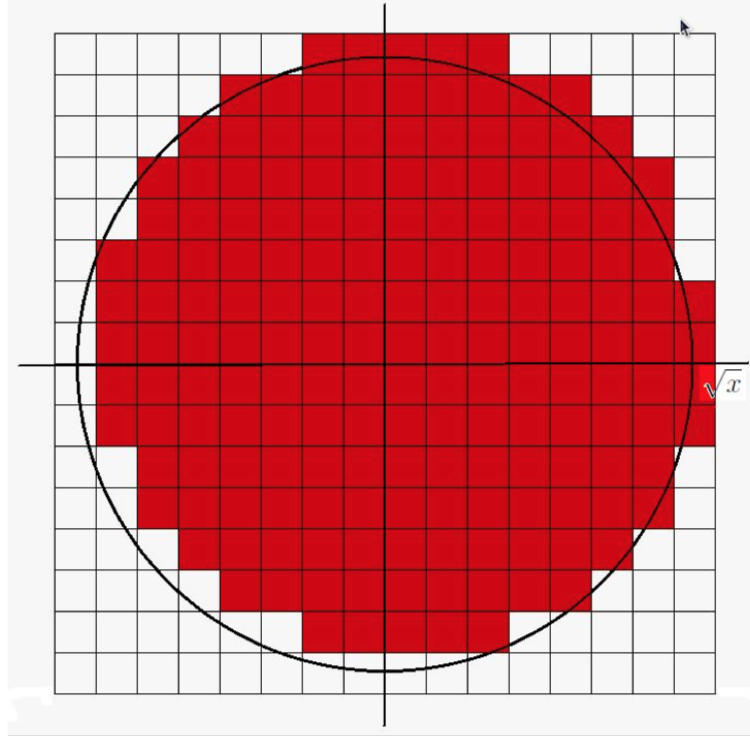Is there a heuristic argument behind the exponent in the circle problem? The problem that I am referring to is the following: Consider a circle of radius $R$ centered at the origin in the plane and let $N(R)$ denote the number of integer lattice points contained in the circle. Then it easy to show that $N(R)/ \pi R^2 \to 1$ as $R \to \infty$. The circle problem asks what is the optimal exponent for the error term.
-
1$\begingroup$ There is a wikipedia article, en.wikipedia.org/wiki/Gauss_circle_problem . See also mathoverflow.net/questions/19079/… for more info. $\endgroup$– noneOct 28, 2018 at 9:01
-
$\begingroup$ Perhaps some more experienced user could help with choice of tags for this question. Specifically, since the Gauss problem is related to lattice points, perhaps some of the tags related to that could be appropriate - maybe (lattices) or (euclidean-lattices). I have previously asked in chat, but I got no feedback on choice of the tags for this question there. $\endgroup$– Martin SleziakOct 29, 2018 at 7:04
2 Answers
The heuristics for this problem is due to Gauss: the error term $\delta N(R)=N(R)-\pi R^2$ must scale with the circumference $2\pi R$ of the circle, because it is along the circumference that the ambiguity of lattice points just inside or just outside the circle appears; Gauss' estimate $\delta N(R)\propto R$ is an overestimate, the configuration of lattice points is such that the excess and deficit of points just inside and just outside partially cancels each other, so that the exponent is closer to $1/2$. Intuitively, this cancellation is obvious from a figure, but to obtain the correct exponent is not something that I think is accessible by any heuristics.
UPDATE: This could be an intuitive argument ("heuristics") for $\delta N(R)\propto R^{1/2}$: The number $M$ of lattice points along the perimeter is of order $R$. If each lattice point contributes $\pm 1$ to $\delta N(R)$, and these $M$ contributions are statistically independent, the total contribution would be of order $\sqrt M\propto\sqrt R$.

Source: The Circle Problem of Gauss and the Divisor Problem of Dirichlet—Still Unsolved.
Each lattice point is associated with a unit cell, chosen such that the lattice point is in the lower-left corner of the cell. Lattice points inside the circle correspond to a cell shown in red. The number of red cells that extends outside the circle cancels approximately with the number of white cells that extend inside, producing a sub-linear scaling of $\delta N$ with the radius $R$ of the circle.
A formula, due to Hardy, expresses the error term $P(x) := N(\sqrt{x})-\pi x$ in terms of values of a Bessel function: $$(*)\, P(x) = x^{1/2}\sum_{n \ge 1}\frac{r(n)}{n^{1/2}}J_1(2\pi \sqrt{nx}),$$ where $r(n):=\#\{ (a,b)\in \mathbb{Z}^2: a^2+b^2=n\}$ (this should be modified slightly for integer $x$). As $J_1(t)=O(1/\sqrt{t})$ as $t\to \infty$, any truncation of the RHS of $(*)$ is $O(x^{1/4})$. Unfortunately, this does not yield such a bound for $P(x)$, since $\sum r(n)/n^{3/4}$ obviously diverges.
There are also various results studying $P(x)$ in mean, usually using $(*)$ or variations thereof. The first such result seems to be Cramér's, who in 1921 showed that $$\int_{1}^{x} P^2(t)\, dt \sim C x^{3/2}$$ for an explicit $C>0$. This is one good reason to suspect that $P(t) = O(t^{1/4+\epsilon})$ (and it certainly shows that $P(t) = O(t^{1/4-\epsilon})$ is impossible, which was proven before by Hardy). Subsequent works include computing the 3rd and 4th moments of $P$ (Tsang), and proving that $P(t)/t^{1/4}$ has a limiting distribution (Heath-Brown).
-
$\begingroup$ I am afraid you mean $Cx^{3/2}$; otherwise the exponents don't match. $\endgroup$ Oct 28, 2018 at 20:54
-
$\begingroup$ @FanZheng Indeed, thanks. It should be correct now. $\endgroup$ Oct 28, 2018 at 21:01
